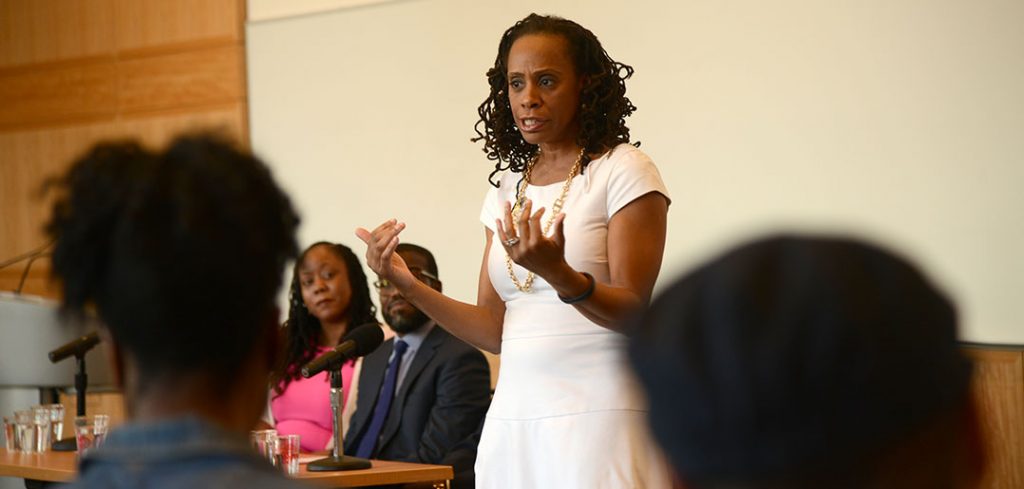Students in Fordham’s nonprofit leadership program recently got some career advice from a tough-minded, innovative group of nonprofit managers: the executive staff of the Harlem Children’s Zone.
Anne Williams-Isom, FCLC ’86, CEO of the model anti-poverty nonprofit, told students that deliberate steps did not always mark her career path. She had no one to help her with college applications, she said, and started out as a lawyer but soon found herself working at the city’s Administration for Children’s Services.
She never imagined she’d be running the Harlem Children’s Zone, but her friend Geoffrey Canada, education activist and the organization’s founder, invited her to work with him as chief operating officer in 2009. She took over as CEO in July 2014.
“I tell my story this way because I want you to know there was no grand plan,” she said. “My plan was to continue to do good work and to show up as my best self.”
A Growing Need
Williams-Isom’s audience was full of students preparing to take the next step in their own career paths—not only master’s degree students but also participants in the executive education certificate program in nonprofit leadership. Both programs are offered by the Graduate School of Social Service.
The center was established in 2010 in response to growing needs and trends in business and social work.
“The time was right,” said Elaine Congress, D.S.W., associate director of the program and associate dean of the Graduate School of Social Service. “[We] saw in the field a real concern that agencies have to look more at the bottom line or they’re not going to survive, and at the same time businesses need to look more at social responsibility.”
Congress said the master’s program, launched last summer, has been “incredibly successful,” with the first cohort of 38 students set to graduate in August.
With or Without Luck
Kwame Owusu-Kesse was one of three Harlem Children’s Zone executives who joined Williams-Isom in speaking with Fordham students at the Lincoln Center campus on May 4.
At just 30 years old, Owusu-Kesse serves as the nonprofit’s chief operating officer. He said his life has been affected by many of the same issues Harlem Children’s Zone (HCZ) students face: domestic violence, teenage pregnancy, single-parent households. But his mom happened to play bingo at a local Catholic school, and the nuns there gave him a scholarship. That small step put him on a path to Harvard. After a stint at Morgan Stanley, he found his way to HCZ.
“In many ways I feel like my personal story was luck,” he said, adding that in his work he strives to figure out how to “remove luck from the equation for tens of thousands of kids.”
“My purpose is to serve my community”
During the Q&A session that followed the panel discussion, two Fordham students revealed that they are alumni of HCZ programs, which aim to break the cycle of generational poverty in and around a 97-block zone in Harlem.
Victoria Draper is a graduate of one of the nonprofit’s most well-known programs: the Baby College. The program offers expectant parents and parents of young children a leg up from the start, providing them with parenting skills and an understanding of child development.
Draper, who expects to graduate from the master’s degree program in August, attended the Baby College with her daughter, Somnia Ray, who’s now 4. She’ll be returning to HCZ later this year. Before the Fordham event, she’d accepted a position with the nonprofit as a special education teacher. She’ll start this fall.
“I feel like my purpose is to serve my community,” said Draper, a Harlem resident and a single mom. “I was thinking about getting an MBA with a nonprofit focus, but then I’m not really a business person, so when I saw [Fordham’s nonprofit leadership] program, it was perfect.”
Draper said she’d like to start a community center in Harlem one day—one that offers college and career readiness programs.
Raised by her grandmother until she was 10, Draper was heavily influenced by the older woman’s devotion to education (she’d earned a PhD) and the black community. When her grandmother died, Draper was sent to live with various relatives and experienced real poverty firsthand.
“If I didn’t have that strong foundation,” she said, “I could have ended up anywhere.”
Draper said she’s “drowning in so many resources” at Fordham and has learned a lot not only from the faculty but also from her fellow students.
When she graduates, she’ll have the mentorship of a current or recently retired nonprofit CEO—a benefit extended to all graduates of the program. And while she appreciates her peers and professors for their resources and connections, there’s something beyond that, she said, with which she feels a kinship.
“They have that social justice mind.”

